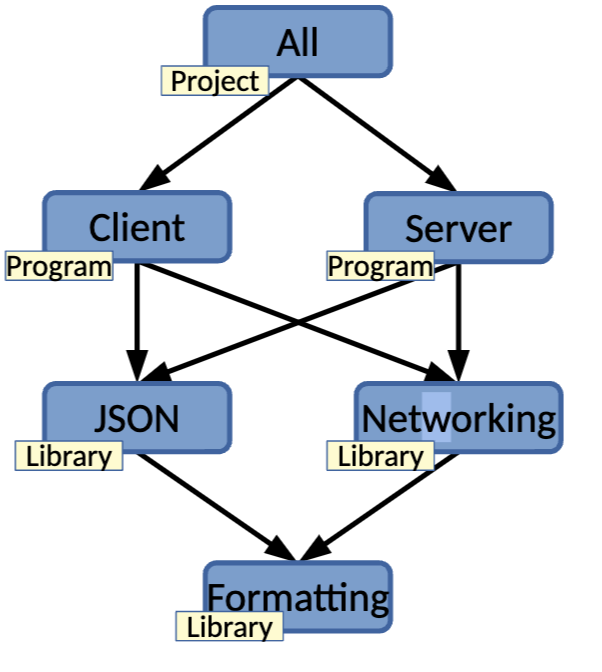background
building software how?
gcc source1.c source2.c -o myprogrammore like:
- build eng
- release eng
- build config
- build automate
- dependency management
- CI/CD
- etc
what building truly means
what truly means to build software:
- version control
- dependency
- build command in diff modes and env
- writing instruction to config and build
- test config and execution
- automated code quality check
- scalable compilation
- deployment
at least ask:
- tools
- workflow
- painful points
- risks
- benefits
- how to make less painful
modeling a build
first consider:
- components and objectives
- dependencies
- good dependency graph - DAG
- modern build management uses DAG to drive build process

→ means depends on
for each component, build management requires:
- direct build req
- transitive usage req
- goal: separate interface from impl
dependency graph - infer to build component correctly based on deps - change only if deps change
cmake
cross-platform build management tool used by large projects
what does:
- input: spec and config of project
- output: build command for you
- like autoconf but easier
why not manual?
- need diff makefiles for different OS, compilers, libs
- spec can capture almost everything and its semantics
benefits:
- scalability
- easier tool integration
make sure it’s out-of-source builds
in source bad because
- need multiple build anyways
- pollutes vcs
- make clean build harder
using cmake
CMakeLists.txt - script in every dir to control how to build things
simple syntax and case insensitive
targets and commands
add_executable(helloworld)add_library(hellohelper STATIC)- can add custom command to build
specifying requirements
target_* commands
target_sources(hellohelper
PRIVATE helloworld.cpp)
target_include_directories(hellohelper
INTERFACE ${dir}/include/)
target_link_libraries(helloworld
PRIVATE hellohelper)using libraries
- transitive interface dependencies - linked as required
- affects program structure and design
general project management
- specifying project properties
project(name)
- print info during build process
message("Built with flags: ${flag}")
- control where things build
set(CMAKE_DIR ${PROJECT_DIR}/bin)
more commands
- find resource to be used
- `find_package(external_proj)
find_library(library)
- installation
install(TARGETS target1 target2 DESTINATION /tmp/)
- control structure - if, loop
pulling remote dependencies
include(cmake/CPM.cmake)
CPMAddPackage(
NAME something
GIT_REPO link
GIT_TAG v0.0.1
)
target_link_libraries(demo
PRIVATE something)analyzing project structure
cmake can dump out dep graph in graphviz format
cmake -graphviz=deps.gv <path-to-proj>
dot -Tpng deps.gv -o deps.svgadvanced build issues
build systems - foundation of workflow and devops
- choke point for controlling dev
- can be expensive and has bottleneck
adding control
- automated testing
- code analysis and metrics
improve performance
- parallel and distributed
- caching
- unification
summary
modern build system leverage dependency graph of project
dependency graph allows
- inference of build and usage
- compositional reasoning about modules and build management